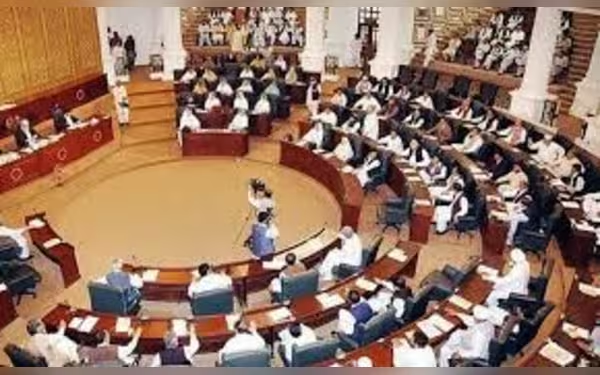Saturday, September 28, 2024 06:14 PM
KP Lawmakers Blame Few Individuals for Political Anarchy
- Lawmakers claim only a few are responsible for political chaos.
- Military and judiciary accused of interfering in politics.
- Call for unity to protect the Constitution emphasized.
 Image Credits: dawn
Image Credits: dawnKP lawmakers assert that only a few individuals are responsible for the political anarchy, highlighting military and judiciary interference.
PESHAWAR: The political landscape in Pakistan, particularly in Khyber Pakhtunkhwa, has been marked by increasing tensions and allegations of interference from military and judicial sectors. On Thursday, members of the Khyber Pakhtunkhwa Assembly voiced their concerns during a session, emphasizing that only a select few individuals are accountable for the prevailing "political anarchy" in the country. This assertion comes amidst ongoing debates about the role of the military in politics and the integrity of the democratic process.
During the assembly session, chaired by Idrees Khattak, lawmakers expressed their determination to challenge the federal government's proposed amendments to the Constitution. Law and Parliamentary Affairs Minister Aftab Alam Afridi articulated the assembly's stance, stating, "There is anarchy in the country just because of a few individuals, who are part of the armed forces and the judiciary and want to run the system according to their will, but we won’t allow them to do so." He further clarified that while the Constitution defines the term "state," it does not mention the "establishment," highlighting a significant gap in the governance framework.
Minister Afridi accused the so-called establishment of orchestrating the ouster of former Prime Minister Imran Khan, claiming that the events of May 9, which led to violence in Kohat, were incited by agents of intelligence agencies. He noted that many PTI leaders faced pressure to abandon their party and join the ranks of former Chief Minister Pervez Khattak, yet most chose to stand firm against fabricated charges.
Another assembly member, Iftikhar Mashwani, contested the denial from the Inter-Services Public Relations director-general regarding military involvement in politics. He recounted his own experience of being pressured by military officials to leave the PTI, stating, "After being called by a major, I stayed in Nowshera for two nights before being shifted to Peshawar where the ISI sector commander asked me to choose between the state and the PTI. I replied that I stood with both." This testimony underscores the complex relationship between political entities and military influence.
MPA Munir Hussain Laghmani urged all parliamentarians to unite in protecting the Constitution, while Akhtar Khan expressed concern over the diminishing public trust in the political system. He highlighted the alarming trend of masked individuals abducting lawmakers from within the assembly, stating, "People are losing trust in the system, so I request institutions to work on improving law and order situation and controlling militancy in Balochistan." This call for action reflects a growing frustration among lawmakers regarding the state of governance.
Opposition member Sobia Shahid remarked on the army's role during natural disasters, asserting that in times of crisis, it is the military that comes to the rescue, not the police. She also pointed out that while the PTI denies attacking military installations, evidence suggests otherwise, warning that participants in the upcoming PTI public meeting in Lahore could face serious repercussions.
As the assembly debates continue, it is evident that the political climate in Khyber Pakhtunkhwa is fraught with challenges. The allegations of military interference and the struggle for democratic integrity raise critical questions about the future of governance in Pakistan. The ongoing discussions in the assembly reflect a broader concern among lawmakers about the need for a clear separation of powers and the importance of upholding the Constitution. As citizens observe these developments, the hope remains that a resolution can be found that respects democratic principles and fosters a stable political environment.













